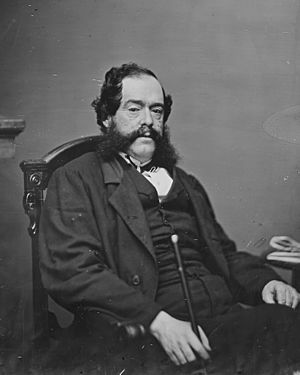Richard Wallach facts for kids
Quick facts for kids
Richard Wallach
|
|
|---|---|
 |
|
| 19th Mayor of the City of Washington, DC | |
| In office September 14, 1861 – June 8, 1868 |
|
| Preceded by | James G. Berret |
| Succeeded by | Sayles Jenks Bowen |
| District of Columbia Alderman | |
| In office 1854–1861 |
|
| Personal details | |
| Born |
Richard Wallach
April 3, 1816 Alexandria, D.C., U.S. |
| Died | March 4, 1881 Washington, D.C., U.S. |
| Resting place | Oak Hill Cemetery Washington, D.C., U.S. |
| Political party | Republican |
| Spouse | Rose Brown |
| Children | 6 |
| Alma mater | Columbian College |
Richard Wallach (born April 3, 1816 – died March 4, 1881) was an important American politician. He served as the 19th Mayor of Washington, D.C.. He was also the first mayor from the Republican Party to lead the city.
Contents
Early Life and Education
Richard Wallach was born in Alexandria, Virginia in 1816. At that time, Alexandria was part of the District of Columbia. He grew up in Washington City, where his father was a successful lawyer.
Richard went to Gonzaga College High School. Later, he attended Columbian College, which is now known as George Washington University. He studied law and became a lawyer in Washington, D.C., in 1836.
Stepping into Politics
Richard Wallach was very active in politics. He first joined the Whig Party. In 1846, he was elected to the Washington Common Council, where he served for two years.
In 1849, President Zachary Taylor chose Wallach to be the U.S. Marshal for the District of Columbia. This was a very important job, making him the chief marshal for the entire United States for a few years.
Joining the Republican Party
After serving as U.S. Marshal, Wallach was elected to the board of Aldermen in 1854. Around this time, he joined the new Republican Party. He ran for mayor of Washington twice against James G. Berret. He lost both times, but he believed there were problems with the elections.
Leading Washington D.C. as Mayor
In 1861, Richard Wallach was the president of the board of Aldermen. The mayor at the time, James G. Berret, was arrested. This happened because he refused to promise loyalty to the United States during the Civil War.
On August 26, 1861, the city councils chose Wallach to finish Mayor Berret's term. After that, Wallach was elected mayor three more times! He was the candidate for the "Unconditional Union" group. He served as mayor until 1868. He was the first Washington mayor in a long time to serve more than one term.
Growing the City
Wallach was mayor during a time when Washington, D.C., grew very quickly. The city changed from a small town to a busy city. Many soldiers and government workers moved there because of the Civil War.
To help the city handle this growth, Mayor Wallach did many important things:
- He started the city's first paid fire department.
- He helped pave many roads and sidewalks, making travel easier.
- He planned and built a modern sewer system and added many water pipes.
- He doubled the number of public schools, so more children could get an education.
Wallach also suggested ways to make the city's streets more beautiful. He successfully asked Congress for money to build a new marketplace in the city center.
During the Lincoln Assassination
Richard Wallach was still mayor when Abraham Lincoln was assassinated in April 1865. He helped lead the police investigation into the crime. He also worked to keep peace among the frightened crowds at Ford's Theater. Later, he led a committee to create a monument for Lincoln.
Schools and Changing Times
Wallach believed in public education. He worked to encourage all children to attend Washington schools. In 1864, a school on Capitol Hill was named the Wallach School in his honor.
However, during his time as mayor, there were big changes happening in the country. New laws were passed that allowed African Americans to vote in Washington, D.C. Wallach was not in favor of these changes. Because of this, he was not re-elected in 1868.
Later Life and Legacy
After leaving office, Richard Wallach went back to being a lawyer in Washington, D.C. He passed away on March 4, 1881. He was buried at Oak Hill Cemetery in Washington.
Even though he had some views that are not supported today, Wallach was remembered by some for his actions. A black member of the school board, John H. Brooks, even suggested a memorial for him. Brooks said that "the colored race owed him a debt of gratitude."
The Wallach School, named after him in 1864, served the community for many years. It closed in 1949 and was taken down the next year.
 | May Edward Chinn |
 | Rebecca Cole |
 | Alexa Canady |
 | Dorothy Lavinia Brown |

